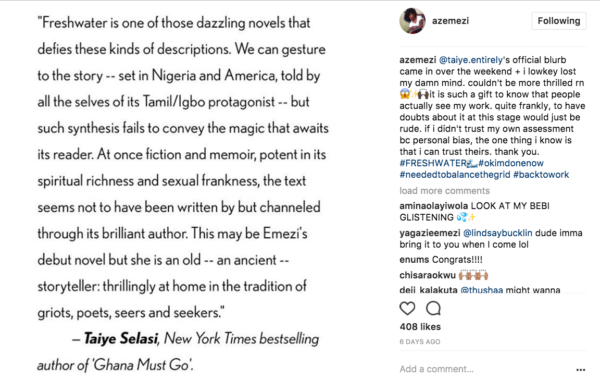
Akwaeke Emezi came on Instagram a few days ago overwhelmed with excitement: “couldn’t be more thrilled…its such a gift to know that people actually see my work.” If you’re wondering, she is referring to Taiye Selasi’s comments about her forthcoming novel Freshwater.
Well, she is not the only one thrilled by Selasi’s comments. We also are. The comments give us way more information about the book than we’ve had in the months since Emezi announced her book deal with Grove Atlantic. The official Grove Atlantic description of the novel isn’t terribly revealing. It says that Freshwater is an “autobiographical novel that explores the metaphysics of identity and mental health, told in boundary-breaking new form and centering on a young Nigerian woman as she struggles to reconcile the proliferation of multiple selves within her.”
We’ve been dying to know more about the story than its exploration of mental health, and Selasi’s blurb is just what we needed.
Fresh water is one of those dazzling novels that defies these kinds of descriptions. We can gesture to the story—set in Nigeria and America, told by all the selves of its Tamil/Igbo protagonist— but such synthesis fails to convey the magic that awaits the reader. At once fiction and memoir, potent in its spiritual richness and sexual frankness, the text seems not to have been written by but channeled through its brilliant author. This may be Emezi’s debut novel, but she is an old— an ancient— storyteller: thrilling at home in the tradition of griots, poets, seers, and seekers
— Taiye Selasi, New York Times Bestselling author of Ghana Must Go
Okay, let’s analyze Selasi’s comments: the novel is set in Nigerian and America. That’s good to know. It draws heavily on Tamil/Igbo thought, cosmology, and perhaps literary archives? We know from Emezi’s posts on Instagram and Twitter that she relied heavily on the Ogbanje mythology to craft the novel’s principal character who happens to be a woman with “multiple selves.”
Still on Selasi’s blurb: “Spiritual richness” is somewhat vague, but “sexual frankness” we can hold on to. That means there will be a good bit of erotic stuff, which is exciting enough. But it also might mean that the feminine body as a site of pleasure will feature prominently in the novel. And we are definitely here for that.
The bit about Emezi being an “ancient storyteller” in the body of a young writer is powerful and points to something that we’ve all sensed about Emezi but never really known to put in those terms. To understand what Selasi means by that statement, you’ll have to follow this link and watch Emezi’s short film on the Igbo figure of the spider. This aura of being from and of another time is something Emezi shares with Nnedi Okorafor. We think it has something to do with the fact that they have this uncanny ability to make old, forgotten things appear so present and urgent for our day.
From the bit we can cobble together, Freshwater is shaping up into a rather fascinating work. We simply can’t wait!










COMMENTS -
Reader Interactions